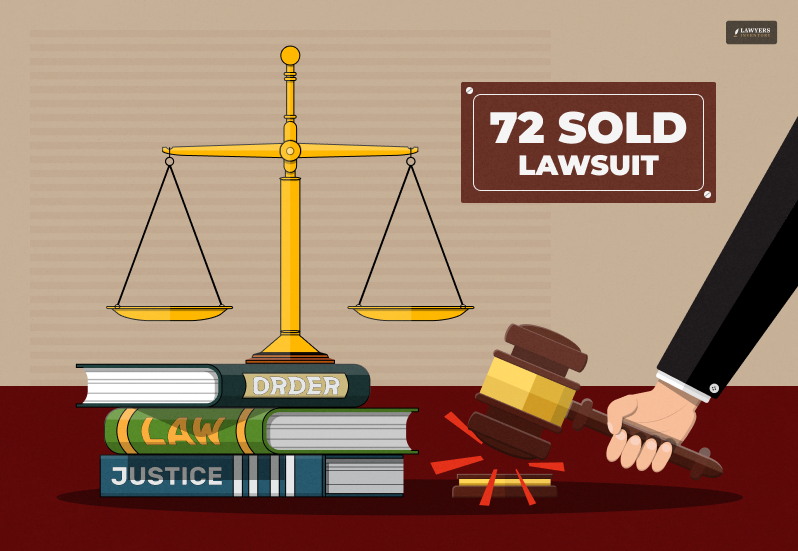
The real estate market is constantly evolving. New models and businesses emerge, sometimes accompanied by legal challenges. 72 Sold, a real estate company, currently faces a lawsuit. This article explores the details of the 72 Sold lawsuit, its background, claims, and potential consequences for both the company and its clients. Whether you’re a home seller, investor, or simply curious, this article provides crucial insights.
What is 72 Sold?
Overview of the 72 Sold Business Model
72 Sold is a real estate company that offers a unique sales process. It promises to sell homes in 72 hours or less. The company uses a streamlined model to connect sellers with buyers quickly. This model has caught the attention of many home sellers seeking fast and simple transactions. However, it has also faced controversy, particularly due to the lawsuit.
How 72 Sold Works
The company claims to sell homes rapidly. It uses a network of agents to provide multiple offers in a short time. Sellers are promised a smooth, quick process, avoiding the lengthy negotiations typical in traditional real estate transactions. However, the 72 Sold lawsuit questions whether this promise is always met.
The 72 Sold Lawsuit: What Are the Claims?
Lawsuit Origins: Disputes Over Business Practices
The 72 Sold lawsuit arises from allegations that the company misled clients. Home sellers claim that the company didn’t meet their expectations. They argue that 72 Sold charged hidden fees and didn’t deliver the promised sale speed. Some sellers also feel they faced unexpected costs. These claims suggest that 72 Sold failed to provide clear, upfront information.
Specific Allegations in the Lawsuit
The lawsuit includes several accusations against 72 Sold:
- Misleading Advertising: Some homeowners argue that 72 Sold created unrealistic expectations. Ads implied that homes would sell within 72 hours, but many sellers experienced delays.
- Hidden Fees: Sellers have complained about hidden costs, including fees not disclosed at the start. They feel that 72 Sold didn’t provide transparency in its pricing structure.
- Failure to Meet Timelines: Many plaintiffs claim that the company didn’t sell their homes within 72 hours. These delays have led to frustration and financial loss for some sellers.
- Unfair Business Practices: Other plaintiffs argue that 72 Sold pressured them into accepting offers that were not in their best interest. They claim they didn’t fully understand the terms before committing to the sale.

The Legal Process Behind the 72 Sold Lawsuit
Filing the Lawsuit: What Happened Next?
Once homeowners became dissatisfied, they decided to take legal action. Lawyers filed the 72 Sold lawsuit on behalf of affected clients. The case questions whether the company violated consumer protection laws. Homeowners seek compensation for hidden fees and financial losses. They also demand accountability for what they perceive as deceptive practices.
What Happens Next in the Lawsuit?
The case is still in progress. The outcome depends on how the legal system interprets the claims. The court will evaluate the evidence, and a ruling may follow. A decision in favor of the plaintiffs could force 72 Sold to change its practices or compensate the homeowners. This case may also influence how other real estate companies operate.
Implications of the 72 Sold Lawsuit
Impact on Home Sellers
For homeowners, the 72 Sold lawsuit could lead to significant financial compensation. If the plaintiffs win, they may receive reimbursement for hidden fees and damages. Sellers could also get back the money they lost due to delays and miscommunication.
Impact on 72 Sold’s Reputation
A lawsuit of this nature can damage a company’s reputation. If the court rules against 72 Sold, it may lose credibility. Sellers could become wary of using the service, fearing hidden costs and delays. Negative publicity could harm its future business prospects, leading to a drop in sales and clients.
Broader Implications for the Real Estate Market
This lawsuit may also have far-reaching consequences for the real estate industry. If the court sides with the plaintiffs, other companies offering similar services may need to adjust their practices. Increased transparency in pricing and terms could become a new standard in the market. The lawsuit might also encourage regulators to scrutinize how companies advertise and handle contracts in real estate.
How Can Home Sellers Protect Themselves?
Researching Real Estate Companies Before Signing
If you’re thinking about using 72 Sold or a similar service, make sure to do your homework. Look for reviews and ask for recommendations from previous clients. Check for any past complaints about hidden fees or broken promises.
Understanding Contracts and Fees
Before signing any contract, read the fine print carefully. Ensure that you fully understand the fees, terms, and conditions. Be clear about the costs involved and ask for clarification if needed. If you’re uncertain, consider consulting a lawyer to help protect your interests.
Conclusion: The Future of the 72 Sold Lawsuit
The 72 Sold lawsuit raises important questions about transparency in the real estate market. The outcome could force the company to change its business practices. Home sellers need to be cautious and well-informed before agreeing to any terms. Whether or not the plaintiffs win, this case will likely have lasting effects on how fast-sale real estate services operate in the future.



